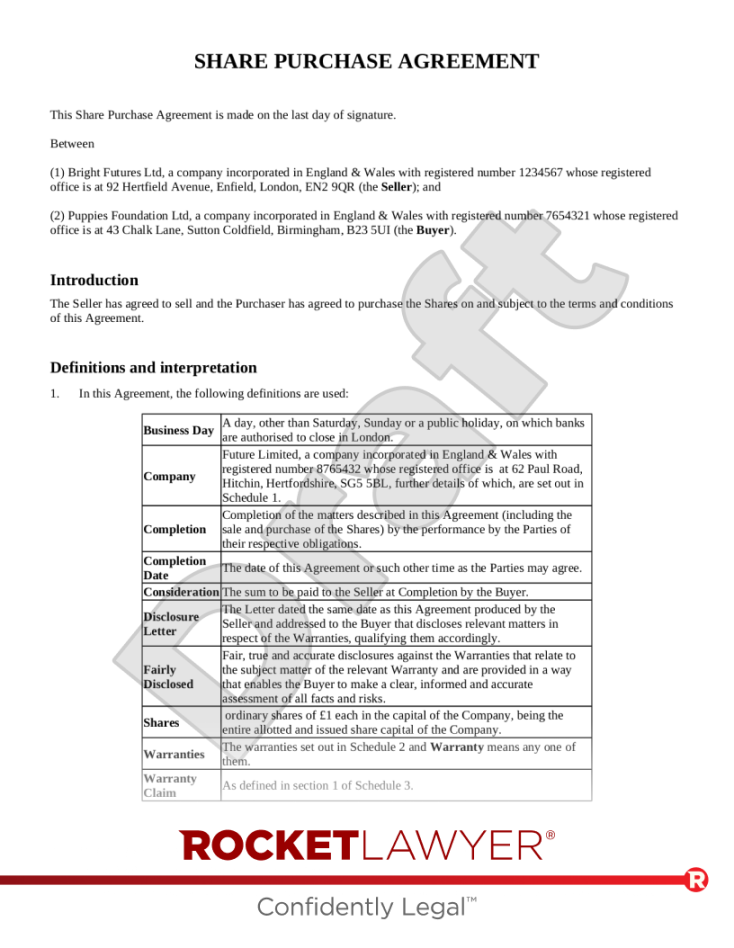A Share Purchase Agreement (SPA) is a legally binding contract that governs the sale and purchase of shares in a company. In the UK, a well-drafted SPA is crucial for a successful and smooth transaction, mitigating potential disputes and ensuring all parties’ interests are protected. This guide outlines the key elements and considerations for creating a professional SPA template.
1. Parties to the Agreement
The SPA must clearly identify all parties involved in the transaction. This typically includes:

Image Source: rocketlawyer.com
Seller: The individual or entity selling the shares.
2. Definitions
A comprehensive definitions section is essential to ensure clarity and avoid ambiguity throughout the agreement. Key terms such as “Shares,” “Closing Date,” “Completion,” “Warranties,” and “Indemnities” should be precisely defined.

Image Source: rocketlawyer.com
3. Sale and Purchase of Shares
This core section of the SPA outlines the specific shares being sold, the purchase price, and the payment terms. It should specify:
Number and class of shares: The exact number and type of shares being transferred.
4. Warranties and Representations
This section is crucial for both the buyer and seller. The seller typically provides warranties and representations regarding the company’s financial position, legal and regulatory compliance, and the accuracy of information provided. These warranties allow the buyer to assess the company’s true value and potential risks.
Key warranties may include:
Financial statements: Accuracy and fairness of the company’s financial statements.
5. Indemnities
Indemnity clauses provide a mechanism for one party to seek compensation from the other for losses or damages arising from breaches of warranties, representations, or other obligations under the SPA.
Indemnity clauses should clearly define:
Indemnifying party: The party responsible for compensating the other party.
6. Conditions Precedent
Conditions precedent are obligations that must be fulfilled before the sale of shares can be completed. These conditions aim to mitigate risks and ensure that the transaction proceeds smoothly.
Common conditions precedent include:
Regulatory approvals: Obtaining any necessary regulatory approvals for the transaction.
7. Confidentiality
A confidentiality clause is essential to protect sensitive information disclosed during the due diligence process and negotiations. It restricts the parties from disclosing confidential information to third parties without prior written consent.
8. Termination
The SPA should outline the circumstances under which either party can terminate the agreement. These circumstances may include:
Material adverse change: A significant negative event affecting the company’s business.
9. Dispute Resolution
The SPA should specify the method for resolving any disputes that may arise between the parties. This may include:
Negotiation: Attempting to resolve the dispute through good faith negotiations.
10. Governing Law and Jurisdiction
The SPA should specify the governing law of the agreement and the jurisdiction for any legal proceedings. This ensures that the agreement is interpreted and enforced according to the applicable legal framework.
11. Entire Agreement
An entire agreement clause states that the SPA constitutes the entire agreement between the parties with respect to the subject matter of the agreement. This clause prevents either party from relying on prior or contemporaneous communications or representations that are not expressly included in the SPA.
12. Notices
The SPA should specify the method for delivering notices and other communications between the parties. This typically includes methods such as email, courier, or registered mail.
13. Severability
A severability clause provides that if any provision of the SPA is found to be invalid or unenforceable, the remaining provisions shall remain in full force and effect.
14. Execution
The SPA should be executed by duly authorized representatives of each party.
15. Legal Advice
It is crucial for both the buyer and seller to obtain independent legal advice before entering into an SPA. An experienced legal professional can help ensure that the agreement adequately protects their interests and complies with all applicable laws and regulations.
16. Professional Presentation
To convey professionalism and trust, the SPA template should be:
Clear and concise: Use plain and unambiguous language, avoiding unnecessary legal jargon.
By carefully considering these elements and seeking professional legal advice, you can create a comprehensive and professional SPA template that provides a solid foundation for a successful share purchase transaction in the UK.